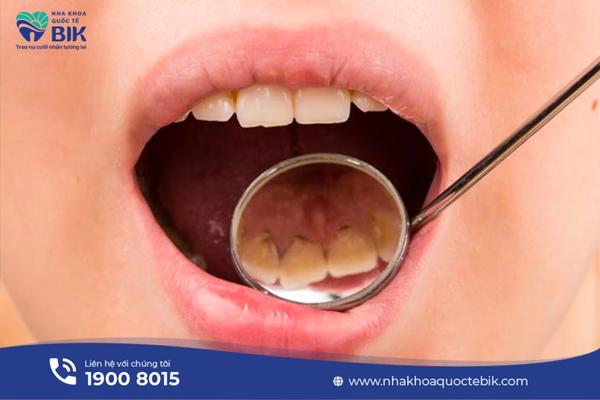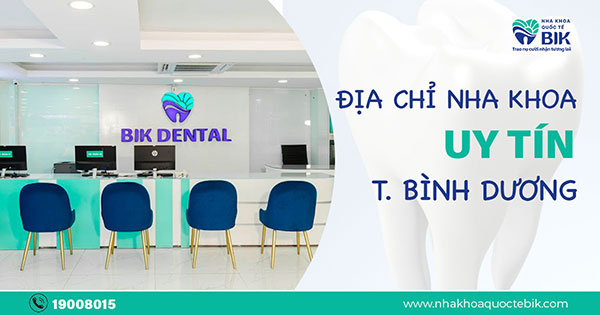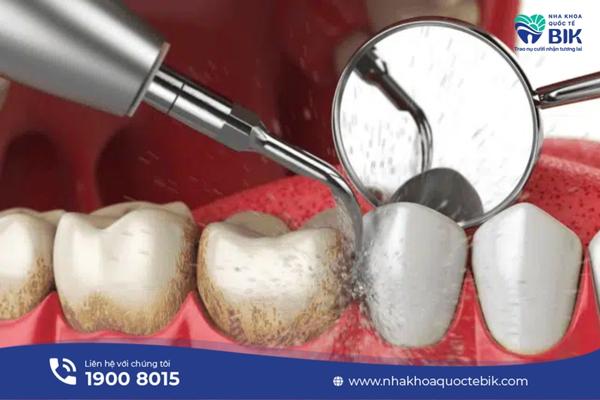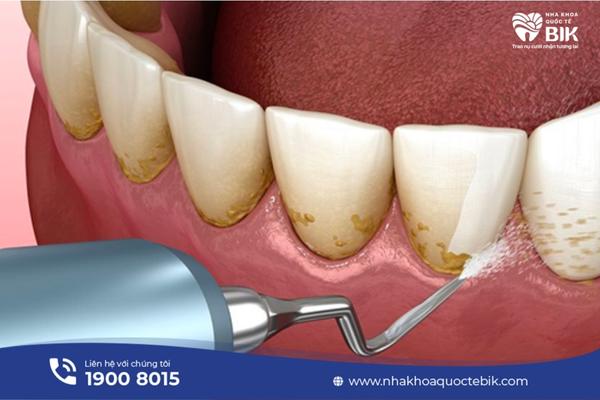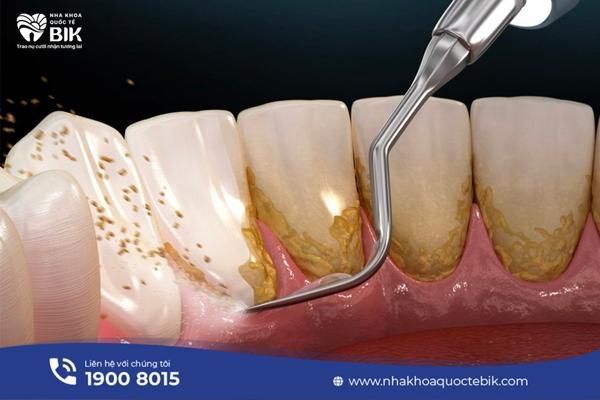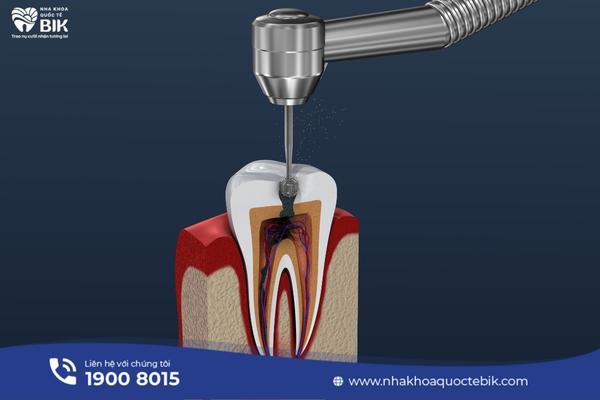Swollen gums of the upper jaw is a common condition that most Vietnamese people suffer from. If not treated promptly, it can lead to other dangerous diseases. So what are the signs of swollen gums of the upper jaw and what is the cause of the disease? Let’s find out with BIK International Dental Clinic through the article below!
1. Causes of swollen gums of the upper jaw
Swollen gums of the upper jaw, also known as swollen gums of the upper jaw, is a seemingly simple condition but is extremely dangerous if not treated properly. Here are some common causes of this condition:
1.1. Swollen gums due to wisdom teeth eruption
Impacted, crooked, crowded wisdom teeth,… are all leading causes of swollen gums in the upper jaw. In adulthood, from 17 to 25 years old, wisdom teeth often grow, when the jawbone and gums are hard, so the wisdom teeth will get stuck in the gums, causing swelling and pain, and serious complications later.
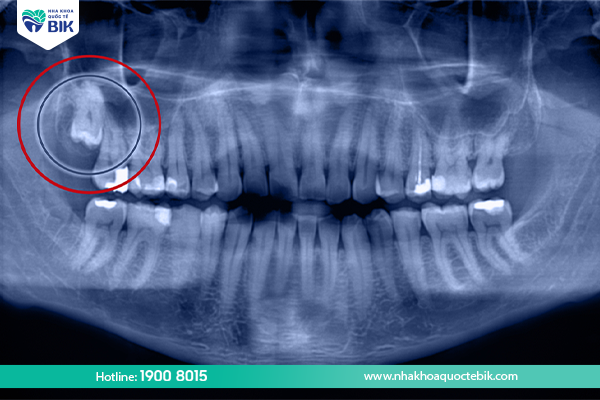
1.2. Dental calculus
If the patient does not have the habit of regularly scaling teeth, it will create a favorable environment for bacteria to accumulate and attack, causing swelling of the upper jaw gums or other locations over time.
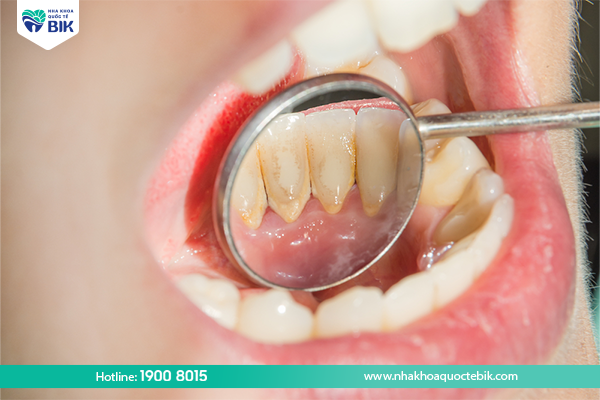
1.3. Due to incorrect brushing
Using too much force to brush your teeth combined with a toothbrush with hard bristles will scratch the gums and damage the enamel. If this process continues, the gums will not have time to recover, and bacteria will have more favorable conditions to invade and cause more harm.
1.4. Gingivitis
Gingivitis or gingivitis is manifested by swelling or irritation of the gums at the base of the teeth. Accompanied by bad breath, toothache when biting, receding gums exposing the tooth root, etc. Over time, it will become increasingly serious, leading to other dangerous diseases such as periodontitis, tooth abscess.
1.5. During pregnancy
Pregnant women will experience hormonal changes in their bodies, which is also the cause of swollen gums in the upper jaw. At that time, the body will produce many hormones that change blood flow, affecting the gums. In some cases, there may be swelling, irritation or bleeding of the gums.

1.6. Some other causes
Some other causes of gum swelling in the upper jaw include side effects of drugs, smoking a lot, wearing inappropriate dentures,…
2. Signs of swollen gums in the upper jaw
Like other common dental conditions, when the gums in the upper jaw are swollen, the patient will experience some easily observed and recognizable symptoms such as:
– The gums change from light pink to darker red.
– The gums bleed easily even with only small external impacts.
– When the gums in the upper jaw are swollen, the tooth roots will recede, causing an unsightly appearance for the patient.
– The gums appear white spots.
– Pain and discomfort appear, causing difficulty in daily activities and chewing.
– Swollen gums with pus or swollen lymph nodes.
– Bad breath.
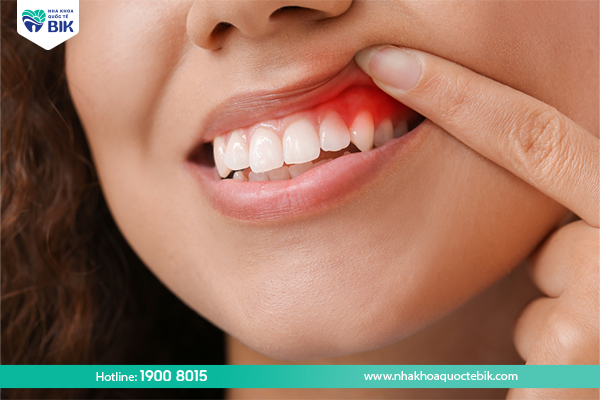
3. What disease is swollen gums in the upper jaw a symptom of?
The gums are soft tissue that covers and supports the teeth to form the jaw. When the gums of the upper jaw are swollen, it can be a symptom of the following diseases:
3.1. Gingivitis
Gingivitis is a disease that causes inflammation around a tooth, swelling of the upper jaw on the left or right side. The inflamed area can fester and bleed easily. The main cause is poor oral hygiene or a weakened immune system, creating conditions for bacteria to attack soft tissue.
3.2. Periodontitis
Periodontitis is a common oral disease, swollen and inflamed gums appear with pus pockets. Swollen gums of the upper jaw are a warning symptom of this disease, when the periodontal pocket is inflamed for a long time, causing the gums to recede, the tooth roots to weaken, and the mouth to have a bad smell. If this condition becomes severe, it can lead to alveolar bone loss and permanent tooth loss.
3.3. Wisdom teeth eruption
Swollen gums in the upper jaw are also a sign that you may be growing wisdom teeth. Due to lack of space in the jaw, wisdom teeth tend to grow crookedly instead of growing vertically, leading to a state of pressure on the swollen, red gums and a dull, lingering pain.
3.4. Infected teeth
Swollen gums in the upper jaw can also be a sign of infected teeth. When the tooth structure is damaged by cracks, chips, fractures, or plaque that wears down the enamel, bacteria will have the opportunity to attack the tooth and cause infection.
3.5. Lack of nutrients
Swollen gums in the upper jaw can also be a sign that the body is lacking nutrients, especially vitamin B and vitamin C which play an important role in maintaining and restoring gums. Patients with nutritional deficiencies will feel tired, uncomfortable, swollen gums and possibly bleeding.

4. How to treat swollen gums in the upper jaw?
Depending on the severity of swollen gums in the upper jaw, there will be home treatments or dental treatments:
4.1. Home remedies
When the gum swelling is still mild, you can apply the following home remedies:
– Rinse your mouth with saline or you can replace it with diluted saline at home. This method will help prevent the growth of bacteria that cause gum swelling. Note that the salt water should not be too salty or too diluted.
– Use honey to reduce gum swelling: Dilute honey and gently apply it to the swollen and painful gums. Honey will help soothe the swelling, disinfect and recover quickly.
– Use ginger tea and chamomile tea: Drinking these two types of tea 2-3 times a day will help fight inflammation effectively due to the ingredients in ginger and chamomile
– Regular oral care: Change your oral care habits appropriately, do not use a toothbrush that is too hard, change your toothbrush periodically, and brush your teeth at least twice a day.
– Scientific diet: Avoid foods that contain too much sugar and starch to limit the accumulation of bacteria that cause harmful to the gums. Do not eat foods that are too hard or sharp that can damage the teeth. In particular, do not smoke and do not use alcohol or mouthwash containing alcohol. Because they can cause dry chicken and irritate the gums during the treatment of swollen gums in the upper jaw.

4.2. How to cure it completely at the dentist
Depending on the cause and severity of the disease, doctors will have different treatments. Early treatment of swollen gums in the upper jaw will help patients avoid future complications. Current treatments include:
– Scaling teeth
– Using drugs to treat gingivitis and tooth abscesses
– Root canal treatment
– Wisdom tooth extraction
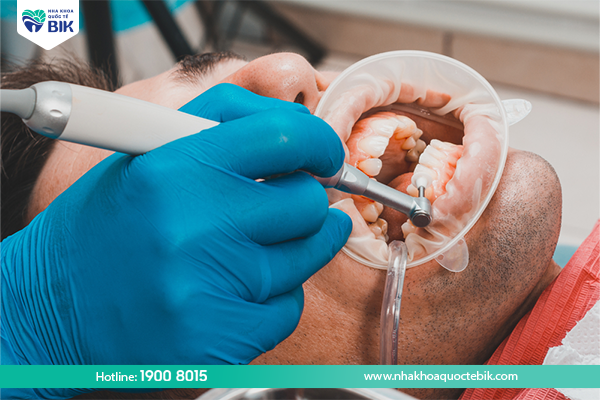
5. How to prevent swollen gums in the upper jaw
To prevent swollen gums in the upper jaw, you should note the following
– Brush your teeth at least twice a day, especially after each meal to remove food plaque.
– Use a soft-bristled toothbrush with moderate brushing force to avoid damaging the gums.
– Replace your toothbrush every 3-4 months to avoid bacteria buildup.
– Use a suitable toothpaste to support healthy gums.
– Combine using dental floss instead of toothpicks to remove food debris between teeth, avoiding damaging the gums.
– Maintain a scientific diet, supplement with all the necessary vitamins and minerals to help increase resistance to help the body fight harmful bacteria.
– Visit the dentist regularly at least every 6 months to ensure that your oral health is checked regularly.
So swelling of the upper jaw gums comes from causes such as wisdom teeth, gingivitis, incorrect brushing, etc. If not treated promptly, swelling of the upper jaw gums not only affects the patient’s daily life but can also be a symptom of other dangerous diseases. Therefore, when you encounter this condition, you can choose BIK International Dentistry as a reliable treatment place with a team of highly specialized and skilled doctors.


